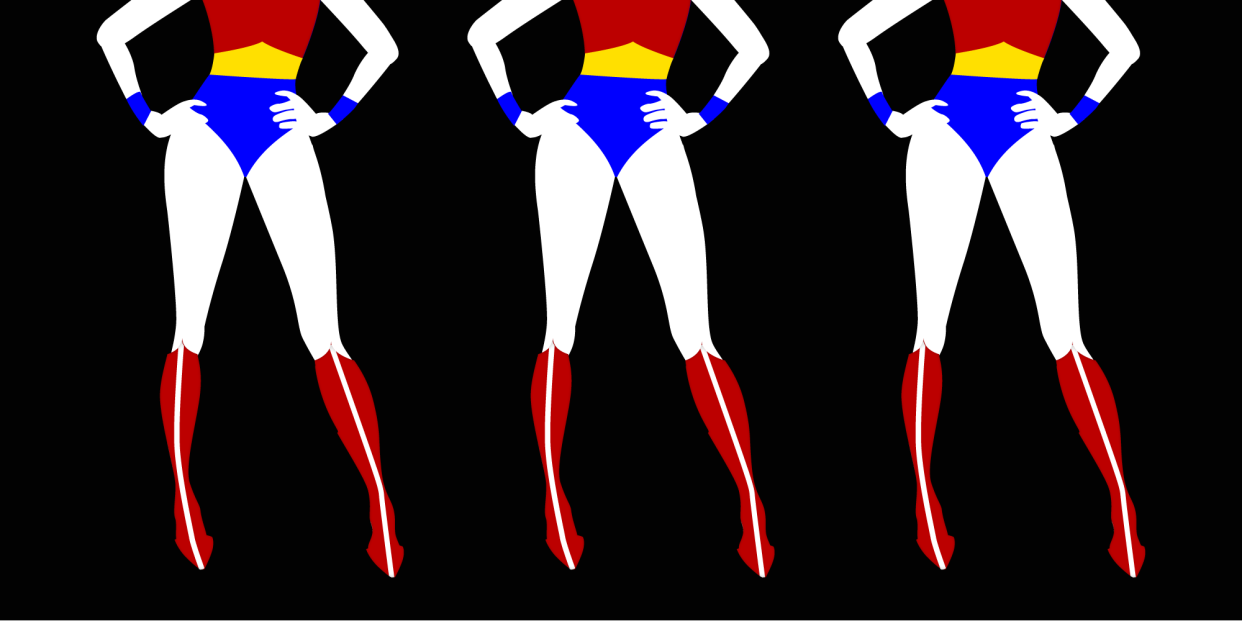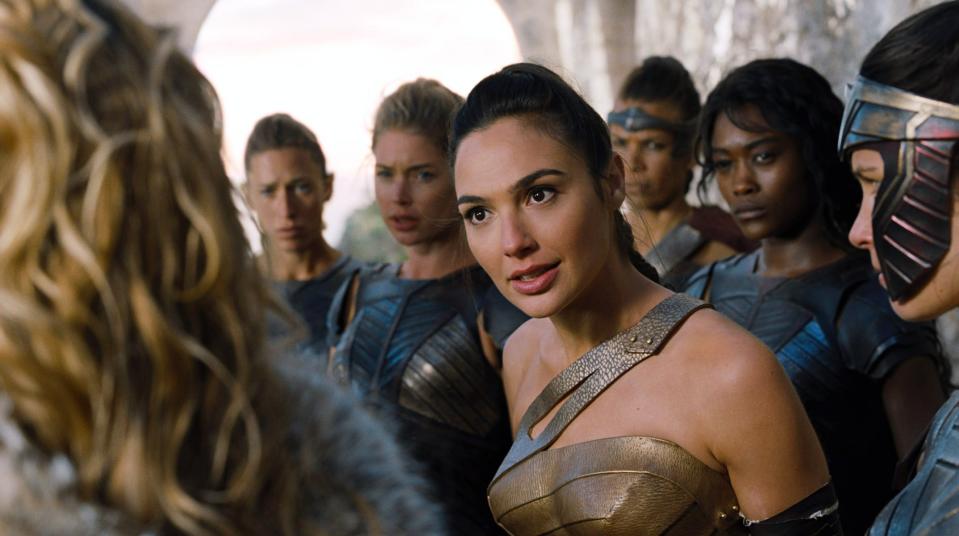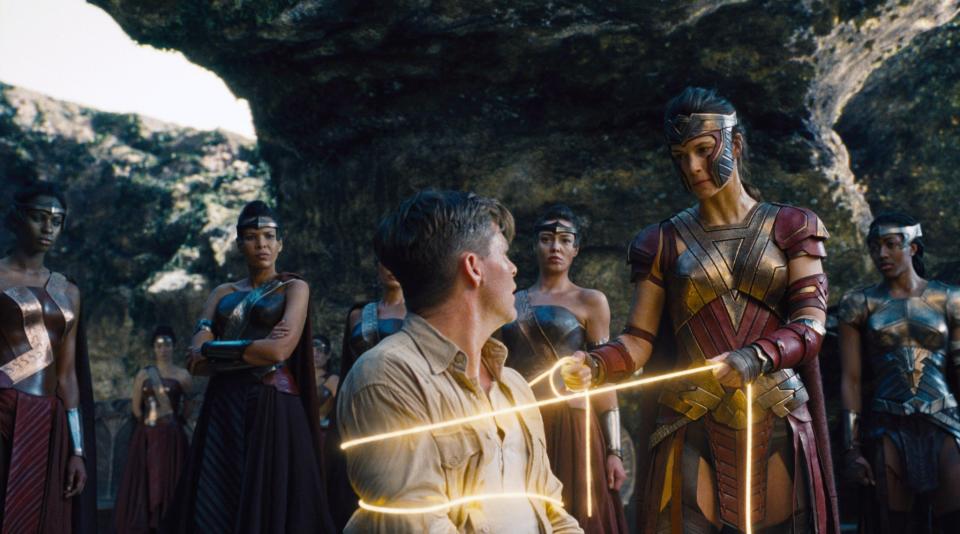'Wonder Woman' Is Bittersweet for Black Women

The release of Wonder Woman marks a significant milestone for representation of women onscreen. Premiering more than 75 years after the character’s creation, the film has been eagerly anticipated for decades, not only because Wonder Woman is one of the most recognizable superheroes and an integral part of the DC Comics legacy, but because a female superhero leading her own film is a long time coming - and invaluable to an industry that all too often shuns women.
"When it comes to mainstream feminism, race and other identities often take a backseat to gender equality—and that simply isn’t good enough."
This past weekend, Wonder Woman opened with more than $100 million in revenue, breaking records to become the highest-grossing opening weekend for a woman director. Many white female fans were overcome with emotion at seeing themselves reflected in Diana Prince (Gal Gadot), who is physically triumphant and unwaveringly optimistic in the face of adversity; in their Wonder Woman-themed shirts and hats, their love for the character is undeniable, a marker of their own dedication to female empowerment and feminism. But the premiere of the Wonder Woman film is bittersweet for Black and other women of color, because even in this so-called “feminist” film, erasure and a lack of inclusion is not only expected, but a given. When it comes to mainstream feminism, race and other identities often take a backseat to gender equality - and that simply isn’t good enough.
Yes, Wonder Woman was an entertaining film. The bright colors, the female gaze of director Patty Jenkins' lens, and the slight nuances which nodded to the superhero’s origins and various incarnations all made for an entertaining watch. I found myself rooting for Diana to rid the world of Ares, god of war, and bring peace to mankind. But like many other films about feminist themes - Mona Lisa Smile, The Help, even Mad Max: Fury Road - I was unable to shake the reality that the film embraced feminism for a very specific community - one that does not have people like me in mind.

In the film, the only Black women depicted are a handful of Amazons on Themyscira, the hidden island where Diana and her people live in peace without men. The first Black woman we’re introduced to is Diana’s caretaker, a representation which hits the Mammy trope on the head. With roots in the transatlantic slave trade, Mammies were Black women who were domestic caregivers, mostly charged with taking care of the children of slave owners and, once slavery was abolished, white families who hired them for low wages. A Mammy literally exists to care for others, with no autonomy and independence of her own. Today, the image of the Mammy - a smiling, grandmotherly type who loves to take care of others - offers white people comfort within their own supremacy by creating the illusion that she did her work out of love, not necessity or survival.
Within this context, it’s sobering to see the first image of Black womanhood on Themyscira within a stereotype Black women have been fighting against for decades. This characterization also made clear that in Wonder Woman's story, Black womanhood would once again be represented as the other, while Diana’s racial ambiguity (but ultimately, her identity as a white woman) is meant to reflect and connect with viewers.
"Connecting Black people to brute strength dates back to slave-selling auctions, where a Black person’s value was directly linked to how physically fit they were."
As for the other Black Amazons - who are only seen within the first 20 minutes of the film, as the story moves away from Themyscira - their physical strength is marveled at and highlighted, as it is with the other Amazons on the island, but this emphasis on physical strength left a bad taste in my mouth. Connecting Black people to brute strength dates back to slave-selling auctions, where a Black person’s value was directly linked to how physically fit they were. Later, this racist rationale justified the assumption that Black people were physically stronger than other races because of genetic differences. Today, Black women athletes like Serena Williams are endlessly ridiculed, their physical strength mocked in anti-Black insults which demean their womanhood. Wonder Woman's emphasis on the Black Amazons’ physical strength and little else - they’re barely named and only have a handful of speaking roles - is a reflection of these same, tired Black stereotypes.

The only other mention of race in the entire movie comes from an offhand joke between Diana and Steve Trevor's (Chris Pine) secretary, Etta (Lucy Davis). When Etta defines her job, Diana responds, “Where I come from, we call that slavery.” This exchange, which implies one would never choose slavery (ignoring that for Black and other people of color, it was not a choice, and is still a painful part of history with repercussions still felt today), reads as tone-deaf and insensitive and solidifies the film's disregard for race and intersectionality within its feminism.
"For the few Black women and other women of color in the film, the luxury of humanization was never extended to its fullest potential."
Historically, Black women have played a significant role in the Wonder Woman comics and media prior to the film. In the comics, Black Amazons were canon (i.e part of the storyline’s continuity) and visible in their own stories, painting a broader, more inclusive picture of what life on Themyscira - and the wider world of the Wonder Woman universe - looks like. In the comics, Philippus, the leader of the Amazon military, plays a significant role in raising Diana and eventually teaching her how to fight. Diana also has a Black sister named Nubia, though they don’t meet until much later in Diana’s story. But even with Black women playing such significant roles in the original Wonder Woman story, their erasure from the film adaptation proves the inclusion of Black women and their stories is still not a priority for mainstream feminism.
Meanwhile, Wonder Woman offers opportunities for white women to exist in a nuanced, multifaceted, humanized way. We see the complexities of Queen Hippolyta (Connie Nielsen) wanting Diana to be raised as a strong, kind woman. We see Diana, in her naivety and earnest resolve to save mankind from itself, settle firmly into the White Savior trope through her unabashed assumption that mankind is flawed and in need of her help, however she wants to give it - never taking the time to ask exactly how and if her help is wanted. But we forgive and love her for it, because she’s a hero we can all look up to and inspires us to be our best selves. We are meant to - and do, without question - love her, because despite her imperfections, she is good, just and courageous. But for the few Black women and other women of color in the film, this luxury of humanization was never extended to its fullest potential, leaving them paling in comparison to the complete, complex characterizations of Diana and other white characters.
"Wonder Woman has an obligation to work just as courageously and valiantly against racism as she does for gender inequality and other social justice causes."
The film’s erasure of women of color and missteps on race send the message that cis, straight, able-bodied, white womanhood is prioritized above all else. It's important that this is not overlooked, because true feminism cannot exist without intersectionality, which demands the dismantling of racism and white supremacy. Wonder Woman - if she is truly a feminist icon and a champion for those who cannot fight for themselves - has an obligation to work just as courageously and valiantly against racism as she does for gender inequality and other social justice causes.
Yes, Wonder Woman is an entertaining, gorgeously directed film and a significant marker for women-led media. However, these things do not make it perfect. In order for these adaptations to continue to be successful, this superhero has a lot of work to do.
You Might Also Like

